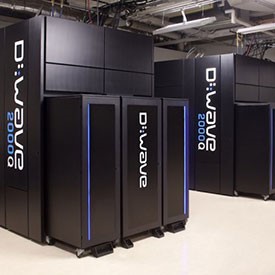The bitcoin mining company’s owner looked back one last time…
Behind him were row upon row of modified PCs, thousands of them, still neatly mounted in their racks. How many times had he walked in, greeted by a wave of heat and the blast of noise from thousands of fan motors inside those machines, straining to keep their microprocessors cool?
It was the sound of digital money being created as each machine’s chip strained to solve another piece of an elaborate cryptographic puzzle — the very basis for the cryptocurrency — and unlock just a little more bitcoin.
It was all gone now. The room had a funereal silence.
The great cryptocurrency boom had gone bust.
No one could explain why, at first. Bitcoin mysteriously plummeted in value for weeks, then months. But news leaks had finally identified the root of the problem…
“Damned quantum computers,” muttered the man as he shut off the lights and walked out for the last time.
Quantum Computing: The Next Step in Cyber-Insecurity
All of that’s made up, of course. But could quantum computing really launch us into a new era of cybersecurity — and spell the end of the cryptocurrency boom to boot?
First, a little explanation: Quantum computing technology is based on the mind-bending aspects of quantum theory.
In “classical” digital computing, information is processed in a binary fashion as a series of ones and zeroes.
With quantum computers, we get bits of information that can coexist in multiple states at any one moment in time. So everything is processed much, much faster.
Big Data problems that take a half-hour to solve with today’s supercomputers can be finished in a mere second — yes, one second — by a quantum computer.
Back in 2014, one of the least-noticed, most earth-shaking aspects of the Edward Snowden affair was the disclosure of documents proving that the National Security Agency was racing to build “a cryptologically useful quantum computer.”
Today, the advances come at a monthly pace…
- On October 10, Intel became the first to successfully fabricate a 17-qubit quantum processing chip. A qubit is a quantum bit of information. Just as in classical chip fabrication, the more bits on the chip, the more power it has.
- Google recently said it wants to build its own 49-qubit quantum processing chip, slated for next year.
- Microsoft said last month it’s developing a full-blown quantum computer “from chips all the way through to the operating system,” according to PCWorld.

Perhaps most stunning of all, the world’s first commercially sold quantum computer — the 2000Q, manufactured by Canada’s privately held D-Wave Systems — went on the market in January. (The price tag is $15 million.)
What’s the point? Cybersecurity investors need to pay attention because quantum computing holds great investment potential. It’s no longer the realm of theory and primitive computer-lab mockups. It’s in the real world, today, right now.
Can you imagine what a quantum computer might do to a cryptocurrency — unlocking its blockchain-based cryptographic puzzle a lot faster than its creators thought possible and dumping thousands of units of it on the market?
And then there’s the challenge — and promise — of using quantum computing for cybersecurity.
How do you keep secrets in a world where even the longest, most random password can be figured out in a few seconds?
Fortunately, if quantum computing were a ballgame, we’re still at the part where some muckety-muck gets up and throws the ceremonial first pitch (that promptly bounces into the dirt just before home plate). But the technology is both a threat and a safeguarding tool at the same time.
Kind regards,

Jeff L. Yastine
Editor, Total Wealth Insider
Editor’s Note: There’s a “magic” metal that’s in every bolt, nail, hammer, bridge, pipe, train and piece of industrial machinery needed for President Donald Trump’s $1 trillion infrastructure plan to move forward. And that’s only part of the reason why the little-known company that has the rights to mine this metal is going to see its stock skyrocket. Click here to see why early investors in this company stand to make up to 30 times their money.




